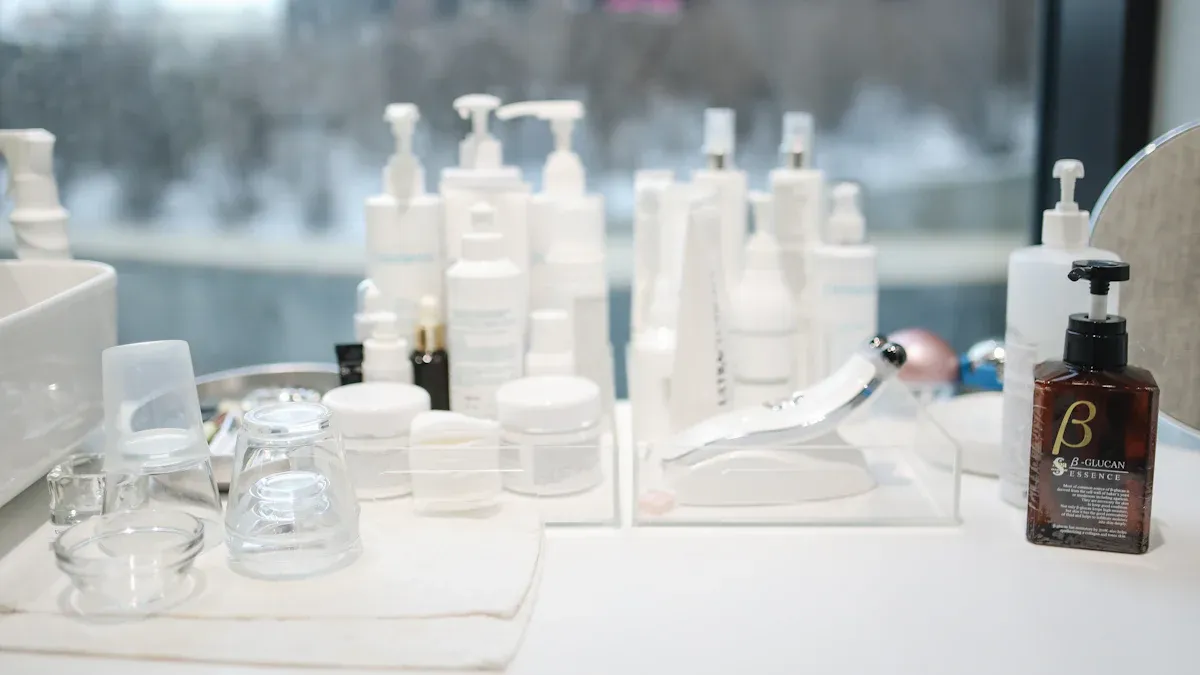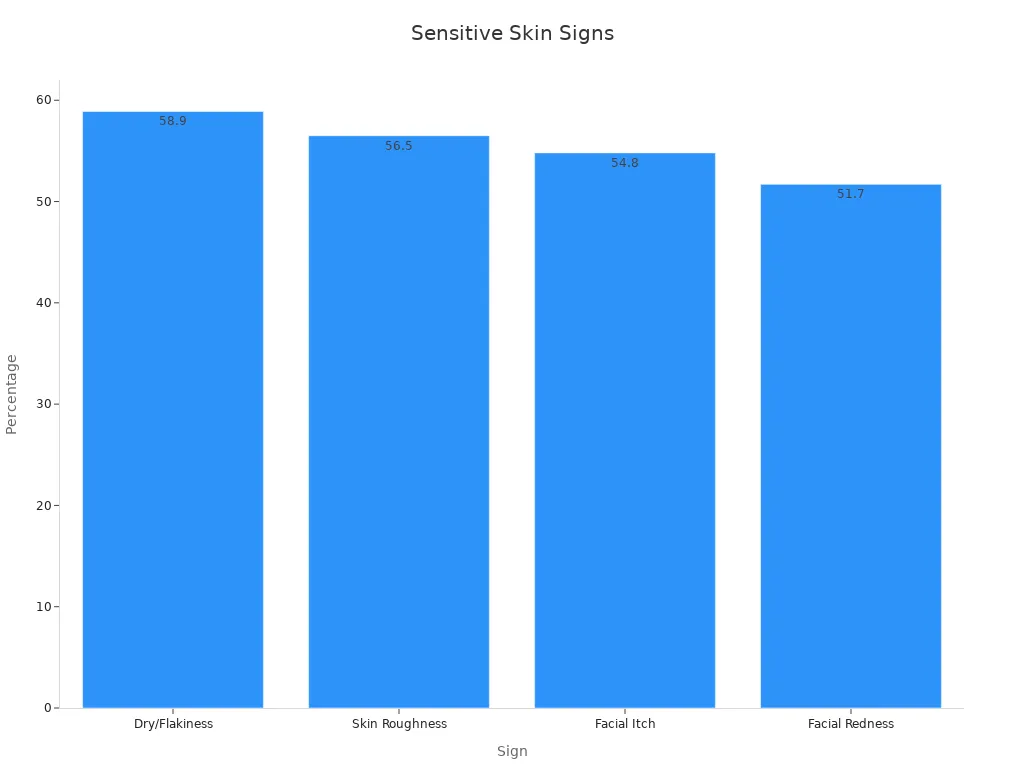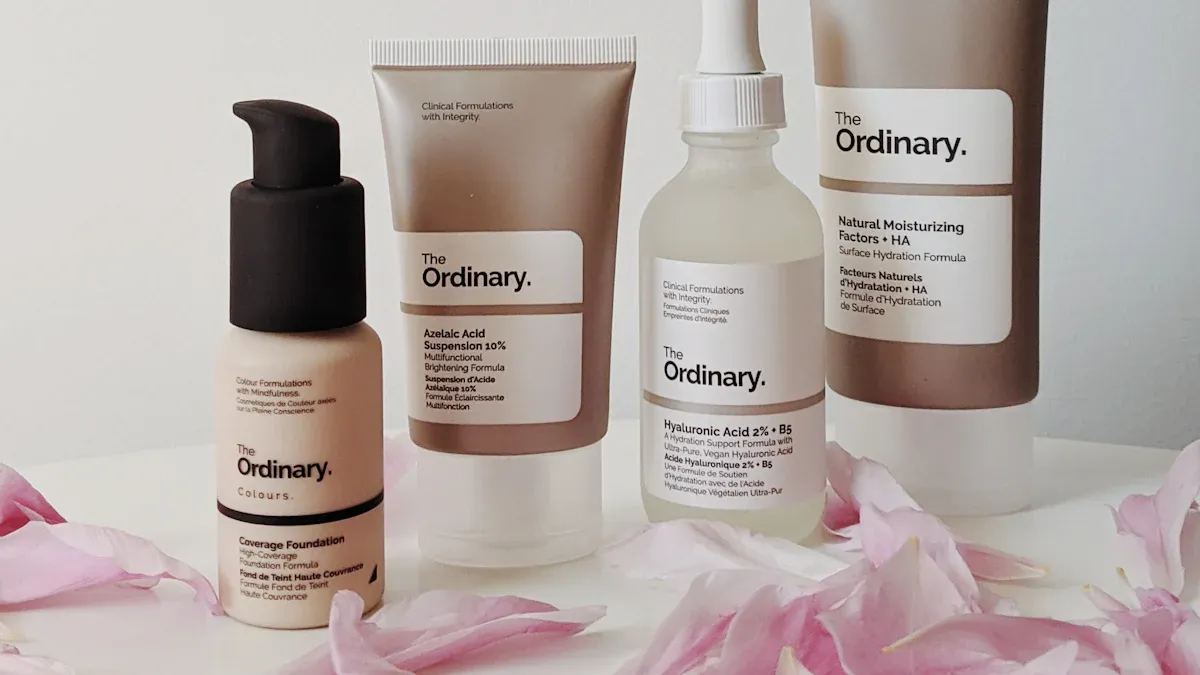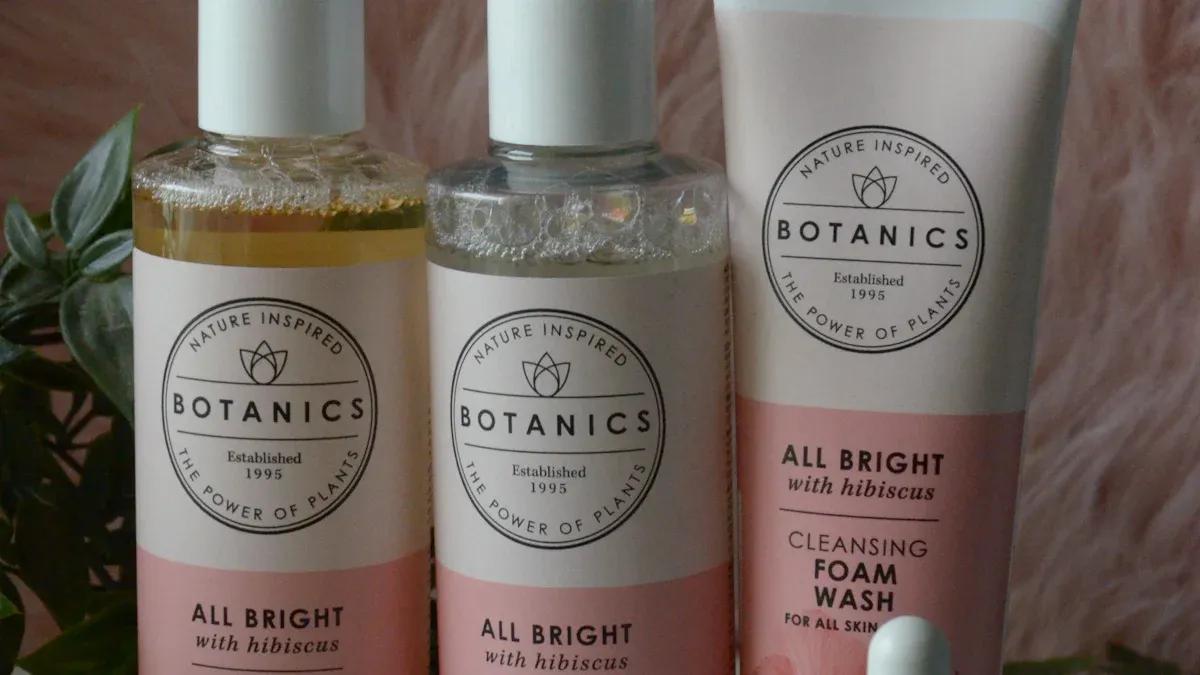
Sensitive skin requires special care to maintain skin health and prevent irritation. Studies show that people with sensitive skin experience heightened neural activity when exposed to triggers like lactic acid. Factors such as age, stress, and seasonal changes worsen this condition. Meeting these unique needs demands effective sensitive skin care that soothes without harm. Sin embargo, creating safe skincare products involves challenges. El rising demand for hypoallergenic solutions, combined with strict regulations and high development costs, makes formulation complex. By focusing on innovation and expertise, you can ensure skincare products that truly cater to sensitive skin.
Understanding Sensitive Skin
What Is Sensitive Skin
Sensitive skin refers to a condition where your skin reacts more intensely to external stimuli compared to normal skin. This heightened sensitivity often results in discomfort, irritación, or visible changes like redness. Sensitive skin types are common across all demographics, but prevalence varies. Por ejemplo, studies show that 44.6% of Americans experience sensitive skin, with women being more affected than men. In India, aproximadamente 32.3% of the population deals with sensitive skin, highlighting the global significance of this condition.
Population | Prevalence of Sensitive Skin | Key Demographics and Findings |
|---|---|---|
American | 44.6% | Higher prevalence in women (50.9% vs. 38.2%). Associated with dry/mixed skin, fair phototypes, and higher reactivity to cosmetics. |
Indian | 32.3% | Estimated ~400 million individuals affected. Suggests a larger population than those seeking dermatological help. |
Common Causes and Triggers
Sensitive skin often reacts to environmental factors, skincare products, or underlying conditions like eczema, psoriasis, and dermatitis. Research indicates that exposure to lactic acid increases activity in the primary sensorimotor cortex, causing heightened sensitivity. Other triggers include pollution, UV radiation, and harsh chemicals in skincare products. Self-assessment surveys reveal that individuals with sensitive skin frequently report irritation, enrojecimiento, and reactivity to environmental changes.
Study | Tipo de evidencia | Recomendaciones |
|---|---|---|
Querleux et al | Self-Assessment Surveys | Strong prevalence of symptoms like irritation, enrojecimiento, and reactivity to environmental factors in sensitive skin individuals. |
Functional MRI Study | Physiological Evaluation | Increased activity in the primary sensorimotor cortex in sensitive skin individuals compared to controls when exposed to lactic acid. |
Prevalence Study | Population Study | Approximately half of the 1000 subjects surveyed were identified as having sensitive skin, with higher prevalence in those with dry and combination skin types. |
Signs and Symptoms of Sensitivity
Sensitive skin manifests through various signs and symptoms, including itchiness, dryness, and redness. These symptoms often worsen with heightened sensitivity to external factors. Por ejemplo, 58.9% of individuals with sensitive skin report dry or flaky skin, mientras 51.7% experience facial redness. Skin roughness and facial itch are also common complaints. These symptoms can significantly impact your quality of life, making effective skincare essential.

Key Ingredients for Sensitive Skin

Sensitive skin requires thoughtful selection of skincare ingredients to maintain hydration, protect the skin barrier, and prevent irritation. Understanding how humectants, emollients, and occlusives work can help you choose products that meet your skin’s needs.
Humectants for Hydration
Humectants are essential for drawing moisture into your skin, keeping it hydrated and smooth. These ingredients work by attracting water from the dermis to the epidermis, ensuring your skin stays moisturized. Common humectants include glycerin, ácido hialurónico, and lactic acid.
💡 Consejo: Look for leave-on products with humectants to combat dryness and itching effectively.
Research highlights the benefits of humectants in sensitive skin care. Por ejemplo, lactic acid at concentrations up to 12% can alleviate rough, dry skin. Lipophilic humectants in leave-on products have also been shown to reduce skin dryness and itching.
Descripción de la evidencia | Enlace de origen |
|---|---|
Leave-on products with lipophilic humectants reduce skin dryness and itching. | |
Lactic acid as a humectant can alleviate rough, dry skin at concentrations up to 12%. | |
A review found that lipophilic humectants in leave-on products help with dryness. | |
Humectants attract moisture from the dermis to the epidermis, enhancing hydration. |
When choosing humectant-based products, prioritize natural formulations that avoid harsh chemicals. These ingredients are ideal for sensitive skin, as they hydrate without disrupting the skin barrier.
Emollients for Skin Barrier Support
Emollients play a vital role in protecting the skin barrier by filling in gaps between skin cells. They smooth and soften your skin while reducing irritation. Ingredients like shea butter, ceramides, and urea are popular emollients in sensitive skin care.
Clinical studies validate the effectiveness of emollients in maintaining skin barrier integrity. Por ejemplo, a study demonstrated that an emollient containing urea reduced symptoms of Keratosis Pilaris, improving skin texture and appearance. Another review emphasized the importance of emollients in addressing skin barrier dysfunction and allergic sensitization.
Products with emollients can also improve your quality of life. Observational studies show that dermocosmetics containing emollients reduce skin sensitivity and discomfort. These findings highlight the importance of emollients in sensitive skin care.
🛡️ Nota: Emollients are particularly beneficial for sensitive skin, as they strengthen the barrier and prevent moisture loss.
Occlusives for Moisture Retention
Occlusives act as a protective layer on your skin, sealing in moisture and preventing water loss. These ingredients are especially helpful for sensitive skin prone to dryness. Common occlusives include petrolatum, beeswax, and squalane.
By forming a physical barrier, occlusives lock in hydration and shield your skin from external irritants. This makes them an excellent choice for sensitive skin care products. Pairing occlusives with humectants and emollients creates a balanced formula that hydrates, protects, and soothes your skin.
When selecting occlusive-based products, opt for natural formulations that avoid synthetic additives. This ensures your skin stays moisturized without risking irritation.
🌿 Consejo: Combine occlusives with humectants and emollients for a comprehensive skincare routine that supports sensitive skin.
Soothing Agents for Calming Irritation
Sensitive skin often experiences irritation, enrojecimiento, and discomfort. Soothing agents play a crucial role in addressing these issues by calming inflammation and restoring balance. These ingredients are carefully chosen to provide non-irritating results while supporting your skin’s natural barrier.
How Soothing Agents Work
Soothing agents reduce irritation by targeting inflammation and promoting skin recovery. They work by neutralizing irritants, reducing redness, and hydrating the skin. Ingredients like aloe vera, manzanilla, and colloidal oatmeal are popular choices in sensitive skincare. These natural compounds contain anti-inflammatory and antioxidant properties that help calm your skin.
Por ejemplo, aloe vera provides a cooling effect that reduces redness and soothes irritation. Chamomile, rich in flavonoids, helps calm inflammation and supports skin healing. Colloidal oatmeal forms a protective layer on your skin, locking in moisture and reducing itchiness.
Benefits of Soothing Agents
Incorporating soothing agents into your skincare routine offers multiple benefits:
Reduces Redness and Discomfort: Soothing agents calm irritated skin, making it feel more comfortable.
Supports Skin Barrier Function: These ingredients strengthen your skin’s barrier, preventing further irritation.
Hydrates and Protects: Many soothing agents also act as humectants or occlusives, ensuring your skin stays hydrated.
Non-Irritating Formulas: Products with soothing agents are often hypoallergenic, making them ideal for sensitive skin.
Evidence Supporting Soothing Agents
Clinical studies highlight the effectiveness of soothing agents in reducing irritation and improving skin health. A comparative study observed the following results:
Treatment Group | Observations | Improvements |
|---|---|---|
α-AZ/oRC | No treatment-related signs reported, except for one case of moderate roughness | Skin felt more comfortable, soothed, less irritated, clearer, smoother, better hydrated, reduction in skin imperfections and inflammation |
Los dermatólogos recomiendan hypoallergenic products with soothing agents for managing chronic skin conditions. These products focus on calming inflammation and avoiding potential triggers, ensuring non-irritating results.
Choosing the Right Soothing Agents
When selecting skincare products, look for those containing natural soothing agents like aloe vera, manzanilla, or colloidal oatmeal. These ingredients provide gentle care without compromising your skin’s barrier. Avoid products with fragrances or harsh chemicals, as they can worsen irritation.
🌟 Consejo: Pair soothing agents with humectants and emollients for a comprehensive skincare routine that hydrates, protects, and calms your skin.
By incorporating soothing agents into your daily routine, you can effectively manage sensitive skin and enjoy healthier, more comfortable skin.
Ingredients to Avoid in Sensitive Skin Care Products

Fragrances and Essential Oils
Fragrances and essential oils may seem appealing, but they can wreak havoc on sensitive skin. Each fragrance molecule, whether synthetic or natural, has the potential to trigger allergic reactions. Dermatologists report that fragrances account for about 16% of contact dermatitis cases. Symptoms like redness, itching, and blistering often appear within 48–72 hours of exposure.
Natural essential oils, often marketed as “seguro,” can be just as irritating as synthetic fragrances. This challenges the common belief that natural products are always better for sensitive skin. Studies estimate that 1–4% of the population experiences allergic reactions to fragrances, and this number continues to rise in industrialized countries. To protect your skin, avoid products with added fragrances or essential oils, even if they claim to be natural.
🚫 Consejo: Look for fragrance-free labels when choosing sensitive skin care products to minimize irritation risks.
Harsh Surfactants and Sulfates
Harsh surfactants like sodium lauryl sulfate (SLS) and sodium laureth sulfate (SLES) strip your skin of its natural oils. This can lead to dryness, inflamación, and even dermatitis, especially if you have sensitive skin. Higher concentrations of these sulfates increase the likelihood of adverse reactions, including redness and swelling.
Experts recommend avoiding products with SLS or similar surfactants if you have conditions like eczema or rosacea. These ingredients disrupt your skin’s barrier, making it more vulnerable to irritants. En cambio, opt for gentle cleansers that maintain your skin’s natural balance.
💡 Nota: Choose sulfate-free cleansers to keep your skincare routine gentle and effective.
Parabens and Preservatives
Parabens, commonly used as preservatives, can cause allergic reactions in a small percentage of people with sensitive skin. Sensitization rates range from 0.5% a 3.5%, which is relatively low compared to other preservatives. Sin embargo, reactions like eczematous rashes and, in rare cases, immediate allergies such as hives or bronchospasm have been documented.
While parabens are effective at preventing microbial growth, their potential to irritate sensitive skin makes them a risky choice. Look for skincare products that use alternative preservatives designed for sensitive skin. These options reduce the risk of irritation while maintaining product safety.
🌿 Consejo: Check ingredient lists for “paraben-free” labels to ensure your sensitive skin care products are safe and gentle.
Alcohols and Drying Agents
Alcohols and drying agents can harm sensitive skin. These ingredients often strip your skin of natural oils, leaving it dry and irritated. While some alcohols are safe, others can worsen skin conditions. Understanding the difference between harmful and beneficial alcohols helps you make better choices for your skincare routine.
Types of Alcohols in Skincare
Alcohols fall into two categories: drying alcohols and fatty alcohols. Drying alcohols, such as ethanol and isopropyl alcohol, evaporate quickly. They leave your skin feeling tight and dehydrated. These alcohols disrupt your skin barrier, making it more prone to irritation. Fatty alcohols, like cetyl alcohol and stearyl alcohol, are different. They act as emollients, helping to soften and protect your skin.
💡 Consejo: Avoid products with drying alcohols if you have sensitive skin. Look for formulations with fatty alcohols for safer hydration.
Effects of Drying Agents
Drying agents, including denatured alcohol, are common in toners and astringents. They remove excess oil but often cause redness and flaking. Sensitive skin reacts strongly to these ingredients, leading to discomfort. Studies show that frequent use of drying agents can weaken your skin’s natural defenses.
Choosing Alcohol-Free Skincare
Alcohol-free skincare products are ideal for sensitive skin. These formulations rely on gentle alternatives to cleanse and hydrate without irritation. Look for labels that specify “alcohol-free” o “suitable for sensitive skin.” Pairing alcohol-free products with soothing agents ensures your skin stays calm and hydrated.
🚫 Nota: Always check ingredient lists to avoid hidden drying agents in your skincare products.
By understanding the impact of alcohols and drying agents, you can protect your skin and maintain its health. Prioritize gentle formulations to keep your skincare routine effective and irritation-free.
Formulating Sensitive Skin Care Products
Balancing pH for Skin Compatibility
Maintaining the right pH level is essential when formulating sensitive skin care products. Your skin has a natural acid mantle with a pH of around 4.5 a 5.5. This slightly acidic environment protects against harmful bacteria and supports overall skin health. Skincare formulations that align with this pH range help preserve the skin’s natural defenses.
Slightly acidic products, con un pH close to 4, are particularly beneficial for sensitive skin. They minimize bacterial colonization, which can reduce irritation and prevent conditions like eczema or acne from worsening. Using products with a neutral or alkaline pH may disrupt the acid mantle, leaving your skin vulnerable to irritation and dryness.
Key Benefits of Slightly Acidic Skincare:
Maintains the skin’s acid mantle.
Reduces bacterial growth.
Supports therapeutic benefits for sensitive skin conditions.
When choosing skincare formulations, always check for pH-balanced labels. These products are designed to work harmoniously with your skin, ensuring compatibility and reducing the risk of irritation.
🌟 Consejo: Opt for slightly acidic formulations to keep your skin healthy and protected.
Selecting Gentle Preservatives
Preservatives play a crucial role in maintaining the safety and longevity of skincare products. Sin embargo, not all preservatives are suitable for sensitive skin. Some synthetic options can cause irritation or allergic reactions, making it essential to choose gentle alternatives.
Natural preservatives like grapefruit seed extract and rosemary extract are excellent choices for hypoallergenic skincare. These ingredients effectively prevent microbial growth without compromising skin health. Además, they align with the growing demand for clean-label products, which prioritize natural and safe formulations.
Why Choose Gentle Preservatives?
Avoids potential irritants.
Reduces the risk of allergic reactions.
Meets consumer preferences for natural ingredients.
When formulating sensitive skin care products, prioritize preservatives that are both effective and non-irritating. This ensures your products remain safe to use while catering to the unique needs of sensitive skin.
💡 Nota: Look for skincare formulations with natural preservatives to minimize irritation risks.
Ensuring Hypoallergenic Properties
Hypoallergenic skincare is designed to minimize the risk of allergic reactions, haciéndolo ideal para una piel sensible. When formulating these products, you must carefully select ingredients that are gentle and non-irritating. Avoiding common allergens like fragrances, sulfates, and parabens is essential to ensure compatibility with sensitive skin.
To create truly hypoallergenic formulations, focus on simplicity. Overly complex formulas with multiple active ingredients can increase the likelihood of irritation. En cambio, opt for a gentle formula that prioritizes soothing and hydrating components. Ingredients like aloe vera, manzanilla, and colloidal oatmeal are excellent choices for calming sensitive skin.
Steps to Ensure Hypoallergenic Properties:
Avoid known allergens and irritants.
Use minimal yet effective ingredients.
Conduct thorough patch testing to confirm safety.
Hypoallergenic skincare formulations should also undergo rigorous testing to validate their safety. Dermatological testing and consumer feedback play a vital role in ensuring these products meet the highest standards of quality and effectiveness.
🛡️ Consejo: Always choose hypoallergenic skincare products to protect your skin from irritation and maintain its health.
Avoiding Overly Complex Formulas
When it comes to sensitive skin, simplicity is key. Overly complex formulas with numerous active ingredients can overwhelm your skin and increase the risk of irritation. Sensitive skin thrives on minimalism, where fewer ingredients mean fewer chances of triggering a reaction.
Why Simple Formulas Work Best
Experts recommend using simpler formulas for sensitive skin. This approach makes it easier to identify potential irritants. If a product causes a reaction, you can quickly pinpoint the ingredient responsible. Starting with single carrier oils instead of complex blends is another effective strategy. This method allows you to manage skin reactions more effectively while still providing nourishment.
💡 Consejo: Always check the ingredient list. Products with fewer components are often better suited for sensitive skin.
The Risks of Overly Complex Formulas
Complex formulas often include multiple active ingredients, preservatives, y fragancias. While these may offer benefits for some skin types, they can disrupt the delicate balance of sensitive skin. Por ejemplo, combining too many actives like retinol, vitamina C, and exfoliating acids can lead to redness, dryness, or even peeling. Sensitive skin requires a gentler approach to maintain its health and resilience.
How to Choose the Right Products
To avoid overly complex formulas, focus on products designed specifically for sensitive skin. Look for labels that highlight simplicity, such as “minimal ingredients” o “hypoallergenic.” Prioritize products with soothing agents like aloe vera or chamomile, which calm irritation without adding unnecessary complexity. Pairing these with humectants or emollients ensures your skincare routine remains effective yet gentle.
Steps to Simplify Your Skincare Routine:
Start with a gentle cleanser free of harsh surfactants.
Use a single moisturizer with hydrating and soothing properties.
Introduce one active ingredient at a time to monitor your skin’s reaction.
By simplifying your skincare routine, you can reduce the risk of irritation and help your skin thrive. Recordar, less is often more when it comes to sensitive skin care.
🌿 Nota: A simple, well-balanced formula can provide all the benefits your skin needs without unnecessary risks.
Testing and Validation for Sensitive Skin Products
Importance of Patch Testing
Patch testing plays a vital role in ensuring the safety of skincare products for sensitive skin. This method evaluates how your skin reacts to specific ingredients before full application. By applying a small amount of product to a discreet area, you can identify potential irritants without risking widespread irritation.
Regulatory guidelines emphasize the importance of patch testing in product development. These tests help classify hazards and create accurate safety data sheets. Traditional methods, such as the murine local lymph node assay and guinea pig tests, have been used to assess skin sensitization. Sin embargo, modern approaches focus on non-animal testing to align with ethical standards.
Tipo de evidencia | Descripción |
|---|---|
Skin Sensitization Testing | Chemicals should be tested for their potential to cause skin sensitization. |
Regulatory Guidelines | Evaluations from patch tests inform hazard classifications and safety data. |
Testing Methods | Traditional methods include animal tests like the murine local lymph node assay. |
💡 Consejo: Always perform a patch test when trying new skincare products to protect your sensitive skin from unexpected reactions.
Dermatological Testing Standards
Dermatological testing ensures that skincare products meet safety and efficacy standards. These tests evaluate how products interact with your skin, focusing on irritation, allergies, and overall compatibility. Patch tests, irritation tests, and allergy tests are commonly used to assess product safety. Clinical trials provide additional data on effectiveness and side effects.
Independent certifications validate product claims, offering you peace of mind when selecting skincare. Regulatory standards also ensure compliance with safety guidelines, protecting consumers from harmful formulations. Benchmarking against industry standards helps brands maintain high-quality products.
Método de prueba | Objetivo |
|---|---|
Patch Tests | Assess skin irritation |
Irritation Tests | Evaluate potential for skin irritation |
Allergy Tests | Identify allergic reactions |
Clinical Trial Reports | Provide data on efficacy and safety |
Adverse Reaction Rates | Monitor side effects during testing |
Regulatory Standards | Ensure compliance with safety guidelines |
Independent Certification | Validate product claims through third parties |
Benchmarking | Compare outcomes against industry standards |
🛡️ Nota: Look for products labeled as “probado en dermatólogo” to ensure they meet rigorous safety standards.
Recopilar comentarios del consumidor
Consumer feedback provides valuable insights into how skincare products perform in real-world conditions. It highlights common issues, such as irritation or lack of effectiveness, helping brands refine their formulations. Para la piel sensible, this feedback is especially crucial, as it reveals how products address specific needs.
Statistics show that 71% of adults report having sensitive skin, con 79% experiencing constant or worsening symptoms. Emotional well-being also ties closely to skin health. Por ejemplo, 90% of rosacea patients report lowered self-esteem, mientras 50% of adults with moderate-to-severe atopic dermatitis struggle with social interactions.
Estadística | Valor |
|---|---|
Percentage of adults with sensitive skin | 71% |
Increase in sensitive skin prevalence over 20 años | 55% |
Patients with skin diseases struggling with emotional disorders | 1/3 |
Adults with moderate-to-severe atopic dermatitis affecting social functions | 50% |
Patients with rosacea reporting lowered self-esteem | 90% |
Participants reporting constant or worsening sensitive skin | 79% |
Participants with sensitive skin before age 30 | 65% |
🌟 Consejo: Share your experiences with skincare products to help brands improve their offerings for sensitive skin.
Sustainability and Transparency in Sensitive Skin Care
Clean Beauty and Sensitive Skin
Clean beauty is transforming the skincare industry. You now have access to natural skincare products that prioritize safety and effectiveness. This movement avoids harmful chemicals, offering solutions that align with your skin’s needs. Para la piel sensible, clean beauty products are especially beneficial. They use gentle, natural ingredients that reduce irritation and promote long-term skin health.
The rise in skin conditions like acne and eczema has fueled demand for clean beauty. You may notice that products labeled as “limpio” often contain fewer synthetic additives. This makes them ideal for sensitive skin, as they minimize the risk of allergic reactions. Además, clean beauty emphasizes environmental sustainability. Eligiendo estos productos, you support brands that care for both your skin and the planet.
🌿 Consejo: Look for clean beauty labels when selecting natural skincare products. They offer safer options for sensitive skin while promoting eco-friendly practices.
Sustainable Ingredient Sourcing
Sustainable ingredient sourcing ensures that the products you use are safe for both your skin and the environment. Natural and oleochemical ingredients are less likely to irritate sensitive skin or cause allergic reactions. These ingredients avoid toxic synthetic chemicals, reducing long-term health risks. High-quality cosmetics sourced sustainably deliver effective results without compromising your safety.
Brands that prioritize sustainability often work with ethical suppliers. They focus on reducing their environmental footprint while maintaining product quality. When you choose skincare products made with sustainably sourced ingredients, you contribute to a healthier planet and support ethical practices.
Benefits of Sustainable Ingredient Sourcing:
Reduces skin irritation risks.
Avoids harmful synthetic chemicals.
Promotes ethical and eco-friendly practices.
🌟 Nota: Opt for products with sustainably sourced ingredients to protect your sensitive skin and the environment.
Clear and Honest Labeling
Clear and honest labeling builds trust between you and the brands you choose. Transparent ingredient lists help you understand what you’re applying to your skin. This is especially important for sensitive skin, as you need assurance that products are safe and effective.
Brands like Lush and The Ordinary have set industry standards by openly sharing their ingredient lists and sourcing practices. Their transparency fosters loyalty and helps you make informed choices. Research shows that consumers value clarity in product labeling. It reduces confusion and ensures you can select products that align with your needs.
The cosmetic industry also emphasizes ethical practices and regulatory compliance. When brands highlight these aspects, they gain your trust and satisfaction. Clear labeling not only benefits you but also encourages brands to maintain high standards in their formulations.
💡 Consejo: Always check ingredient lists for transparency. Products with clear labeling are more likely to meet your sensitive skin care needs.
The Role of Oully in Sensitive Skin Product Development
Expertise in Custom Formulation
Oully specializes in creating custom formulations tailored to meet the unique needs of sensitive skin. Con más de una década de experiencia, Oully understands that every skincare product must balance effectiveness with gentleness. Their team of experts carefully selects ingredients that hydrate, soothe, and protect without causing irritation.
Oully’s approach to formulation prioritizes simplicity. By avoiding overly complex formulas, they reduce the risk of adverse reactions. Each product undergoes rigorous testing to ensure it meets hypoallergenic standards. Whether you need a calming moisturizer or a gentle cleanser, Oully’s custom solutions provide safe and effective care for sensitive skin.
🌟 Consejo: Collaborate with manufacturers like Oully to create skincare products that cater to your audience’s specific needs.
Commitment to Quality and Safety
Oully’s commitment to quality and safety sets them apart in the skincare industry. They adhere to strict regulatory standards, including FDA and EU guidelines, to ensure their products are safe for sensitive skin. Their quality assurance practices include dermatological testing, clinical trials, and independent certifications.
Quality Assurance Practice | Descripción |
|---|---|
Dermatological Testing | Patch tests, irritation tests, and allergy tests ensure product safety. |
Regulatory Standards | Compliance with FDA and EU safety guidelines. |
Transparencia | Clear communication of product claims and recall processes. |
Clinical trials further validate the safety and effectiveness of Oully’s products. These trials include diverse test populations and monitor adverse reaction rates to ensure hypoallergenic formulations.
Objetivo | |
|---|---|
Patch Tests | Assess skin reactions to products. |
Allergy Tests | Identify potential allergens. |
Clinical Trials | Evaluate overall product safety and effectiveness. |
By prioritizing safety at every stage, Oully builds trust with brands and consumers alike.
Sustainable and Transparent Manufacturing Practices
Oully’s manufacturing practices reflect their dedication to sustainability and transparency. They source ingredients responsibly, ensuring that each component is safe for both your skin and the environment. Their facility operates under FDA, ISO, y certificaciones CGMP, guaranteeing high-quality production standards.
Transparency is a cornerstone of Oully’s philosophy. They provide clear labeling and detailed ingredient lists, empowering you to make informed choices. This approach aligns with the growing demand for clean beauty and hypoallergenic skincare.
🌿 Nota: Choosing a partner like Oully ensures your products meet both ethical and environmental standards.
Oully’s sustainable practices and transparent operations make them a trusted partner for brands looking to create effective, hypoallergenic skincare solutions.
Sensitive skin demands thoughtful care and attention. You must understand its unique needs to create effective skincare solutions. Choosing gentle ingredients, conducting thorough testing, and adopting sustainable practices ensures your products deliver safe and reliable results.
Best practices like balancing pH, using hypoallergenic formulations, and prioritizing clean beauty help you meet consumer expectations. These steps build trust and foster loyalty. By innovating and maintaining transparency, you can lead the way in sensitive skincare development.
🌟 Consejo: Focus on simplicity and safety to create skincare products that truly make a difference.
Preguntas frecuentes
What makes a skincare product suitable for sensitive skin?
A product suitable for sensitive skin uses gentle ingredients that hydrate and protect without causing irritation. It avoids harsh chemicals, fragancias, y alérgenos. Busque etiquetas como “hipoalergénico” o “probado en dermatólogo” Para garantizar la compatibilidad con su piel.
How can I test if a skincare product is safe for my skin?
Perform a patch test. Apply a small amount of the product to your inner arm or behind your ear. Wait 24 hours to check for redness, itching, or irritation. This simple step helps you avoid adverse reactions.
Are natural ingredients always better for sensitive skin?
Not always. Some natural ingredients, like essential oils, can irritate sensitive skin. Focus on products with proven soothing agents like aloe vera or chamomile. Always check the ingredient list to ensure it aligns with your skin’s needs.
How often should I change my skincare routine?
Stick to a consistent routine unless your skin reacts negatively to a product. Introducing new products too often can overwhelm your skin. When trying something new, add one product at a time and monitor your skin’s response.
Can I use anti-aging products if I have sensitive skin?
Sí, but choose products specifically designed for sensitive skin. Look for gentle formulations with hydrating and soothing ingredients. Avoid strong actives like retinol unless they are labeled as suitable for sensitive skin.
















